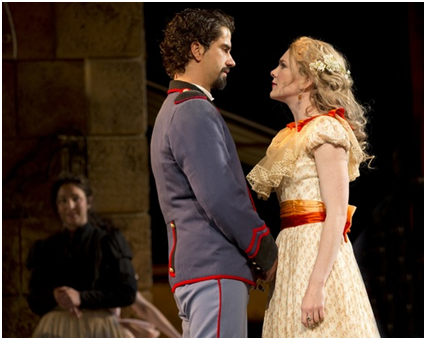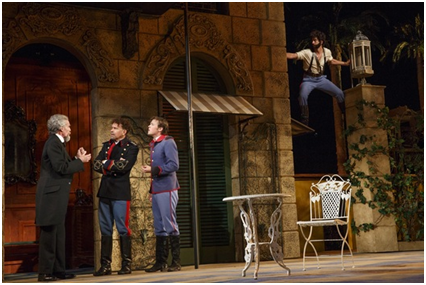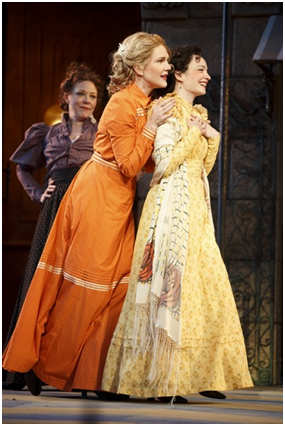Much Ado About Nothing
Big entertaining Shakespearean comedy reset in Victorian era re-teams Lily Rabe and Hamish Linklater as feuding lovers Beatrice and Benedick.

Hamish Linklater and Lily Rabe in a scene from Much Ado About Nothing (Photo credit: Joan Marcus)
[avatar user=”Victor Gluck” size=”96″ align=”left” ] Victor Gluck, Editor-in-Chief[/avatar]Jack O’Brien has made an excellent career out of directing big shows like his Tony Award-winning productions of The Coast of Utopia, Henry IV and Hairspray. Now he has taken on Shakespeare’s comedy of mismatched mature love, Much Ado About Nothing, for the opening play of this season’s Shakespeare in the Park and treated it as if it were a brand new musical comedy. The results are truly delightful and it doesn’t hurt that as Beatrice and Benedick, he has reteamed Lily Rabe and Hamish Linklater as well as surrounding them with Tony Award winners Brian Stokes Mitchell and John Glover. In keeping with the musical comedy atmosphere, he has asked long-time collaborator David Yazbek (Dirty Rotten Scoundrels and The Full Monty) for a memorable new score as well as using four onstage musicians who at times become part of the action.
Much Ado About Nothing is most famous for its pair of feuding lovers Beatrice and Benedick who carry on a “merry war” throughout the play. Both claim to be averse to love and mock those who praise it but both seem to be crying out for someone to domesticate them. Their hostility suggests that most likely they have been badly hurt at some time in the past. Rabe and Linklater who have appeared opposite each other in The Public Theater’s 2010 The Merchant of Venice which moved from the park to Broadway and in Theresa Rebeck’s 2011 Seminar, have an easy, comfortable rapport and continue the trend of having these characters played by younger actors rather than the middle-aged couples of the recent past. This gives the play more of a light-hearted knockabout quality that reflects O’Brien’s entire production, one which requires Linklater to climb a tree and shimmy across a wall. The one shortcoming is the bigger-than-life portrayals of these characters which might be attributable to Acme Sound Partners who make them appear to be shouting at all times.
The magnificent setting depicting an attractive estate in Sicily is the work of John Lee Beatty. A two-story villa with a second floor balcony is in a lovely park which includes a vegetable and flower garden, a large orange tree (good for hiding), and a working stone fountain, as well as an ivy covered wall which is susceptible to music and conveniently moves when played to sweetly. In keeping with the Italianate setting, the play begins with the cast speaking Italian and then segues into English at just the right moment. To the home of Leonato, Governor of Messina, comes his friend Don Pedro, the Prince of Aragon, back from the wars with his seconds-in-command, young Count Claudio and sworn bachelor Benedick, lord of Padua, as well as his dour half-brother Don John. Living with Leonato are his daughter Hero and her cousin Beatrice who has had a thorny relationship with Benedick in the past. They immediately pick up their witty duel of words as soon as they meet. Hero and Claudio become engaged at the masked ball given for the visitors and the rancorous, jealous Don John along with his followers Borachio and Conrade decide to spoil this relationship.

John Glover, Brian Stokes Mitchell, Jack Cutmore-Scott and Hamish Linklater in a scene from Much Ado About Nothing (Photo credit: Joan Marcus)
In the meantime, Don Pedro has resolved to bring the seemingly intractable Beatrice and Benedick together since it is obvious to him that they are secretly in love. With the help of Leonato and Claudio, he works on Benedick to convince him that Beatrice is pining for his love, while Hero, her governess Ursula and her waiting gentlewoman Margaret work on Beatrice’s emotions. Don John’s plot to make Claudio think that Hero is unfaithful is believed, and Beatrice and Benedick are thrown together in their mutual grief. Beatrice declares that she wishes she were a man to challenge Claudio for his outrageous treatment of her innocent cousin, and Benedick obligingly agrees to do it for her. This being a comedy all works out happily in the end after a series of further plots, one of which is exposed by the bumbling and pretentious Constable Dogberry (famous for fracturing the English language) and his watch made up of equally clumsy misfits.
Linklater is both an extremely athletic Benedick as well as a garrulous one, while Rabe is a very self-assured, commanding young woman. The parts of Don Pedro and Leonato are often throwaway roles so that it is fascinating to see major stage stars play them instead, making them real players in the action. Stokes Mitchell is a joyous Don Pedro playing matchmaker during this time of rest and relaxation. It would not make sense to hire a singing star and then give him nothing in his line, so it is not surprising that when the strolling guitarist Balthazar (played by Steel Burkhardt) begins singing Yazbek’s setting of Shakespeare’s ironic “Sigh No More, Ladies,” that baritone Stokes makes it a duet giving us a glorious musical interlude. Glover also adds humor and gravitas to the role of Leonato, the genial host, who must deal with the humiliation of his only daughter.

Kathryn Meisle, Lily Rabe and Ismenia Mendes in a scene from Much Ado About Nothing (Photo credit: Joan Marcus)
As the young lovers, Hero and Claudio, Ismenia Mendes and Jack Cutmore-Scott make an attractive couple and become extremely impassioned when the stakes are raised. In a role often taken for granted, David Manis as Leonato’s brother Antonio is also quite emotional when his niece’s honor is impugned. Pedro Pascal (most recently of HBO’s Game of Thrones) is a low-key Don John rather than the usual over-the-top villain which is all the more frightening. As the constable who can’t get a word correct, John Pankow makes the unusual decision to play this as a character part rather than as a comic one, which gives him more weight but makes his scenes less humorous. Kathryn Meisle as Hero’s governess is as feisty a woman as Beatrice. All are dressed in Jane Greenwood’s charming and colorful late Victorian costumes. Jeff Croiter’s lighting design bathes the set in the sun of Italy whether it is for daylight or during the moonlight scenes.
While Jack O’Brien’s production of Much Ado About Nothing is in no way definitive, it is tremendous fun. His strength here as a director is that his 20 person ensemble has become a true community, one that lives and loves together, one we can believe gets involved in each other’s problems and joys. While this production does not seem to have a new point of view, it suggests that we are all fools when in love and need others to help jolly us out of our temporary madness. It is also a pleasure to see Lily Rabe and Hamish Linklater reteamed as they continue to develop as an acting couple.
Much Ado About Nothing (through July 6, 2014)
Shakespeare in the Park
The Public Theater at the Delacorte Theatre in Central Park, 81 Street and Central Park West or 79th Street and Fifth Avenue, in Manhattan
Free tickets distributed at Noon at the Delacorte Box Office to those on prior line or by lottery at http://www.publictheater.org






Leave a comment